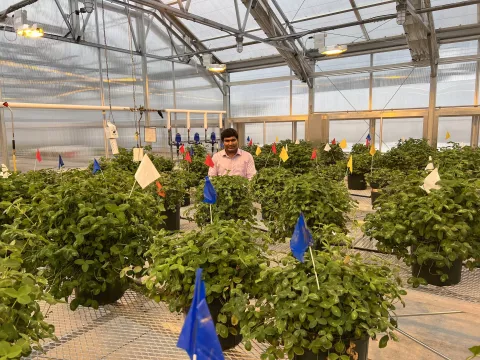
Palash Mandal is a doctoral candidate in COLSA's agricultural sciences PhD program. He expects to receive his degree in May 2025. Palash, who is from Pirojpur, Bangladesh, received his bachelor’s degree in agriculture and his master’s degree in agronomy from Sylhet Agricultural University in Bangladesh. He also earned a second master’s degree in plant sciences from Wageningen University in the Netherlands.
Palash received a Dean's Award for Distinction in 2024.
Palash Mandal: Forage legumes are plants often used as high-quality feed for dairy cows, whether they're raised conventionally or organically. They offer various benefits to the environment as well. However, some forage legumes synthesize and accumulate phytochemicals known as phytoestrogen in their tissues. Phytoestrogens structurally and functionally mimic the mammalian sex hormone estrogen, which, if consumed in excess, may impair an animal’s regular reproductive performance in different ways. Further, phytoestrogens ingested by dairy cows are transferred to their milk through feed and consequently enter human food systems.
My research is focused on quantifying the environmental drivers that influence the phytoestrogen accumulations in perennial forage legumes. We can minimize phytoestrogen accumulation in forage legumes and exposure to phytoestrogen in dairy and phytoestrogen transfer to milk by figuring this out.
Palash: I wish my colleagues, friends and family knew that my work on phytoestrogens is not just about plants; it has significant implications for both human and animal health. Understanding how phytoestrogens affect us is important across various fields, including agriculture, nutrition and medicine.
Palash: My research is significant because it demonstrates the interconnection between crop and animal agriculture. Minimizing phytoestrogen exposure in animals is crucial for preserving their reproductive health and preventing the transfer of phytoestrogens to milk.
Palash: During my PhD journey, I was initially focused solely on my specific field of study. However, as I delved deeper into my research, I began to recognize the interconnectedness of various disciplines. Collaborating with experts from different fields opened my eyes to new perspectives and approaches that I hadn't considered before.
This interdisciplinary approach not only enriched my research but also led to more comprehensive and impactful results. I realized that by integrating insights from diverse disciplines, we can address complex challenges more effectively and produce more meaningful outcomes.
Palash: Balancing my personal and research life while overcoming linguistic limitations is a challenge for me.
Palash: I'm continually driven by my passion for research and my desire to contribute to ensuring food and nutritional security for humanity.
Palash: I take pride in my strong work ethic and unwavering focus on achieving my goals.
Palash: I chose UNH because of its alignment with my research interests in abiotic and biotic factors and their impact on crop yield and quality. The university's expertise in this area, particularly through my prospective advisor, complements my research goals perfectly. I believe that UNH provides an ideal environment for me to pursue my academic and research ambitions effectively.
Palash: I am deeply interested in conducting research, but equally important to me is the opportunity to contribute to the academic community. I see myself in a university setting, where I can engage in scholarly pursuits, mentor students and advance knowledge in my field.